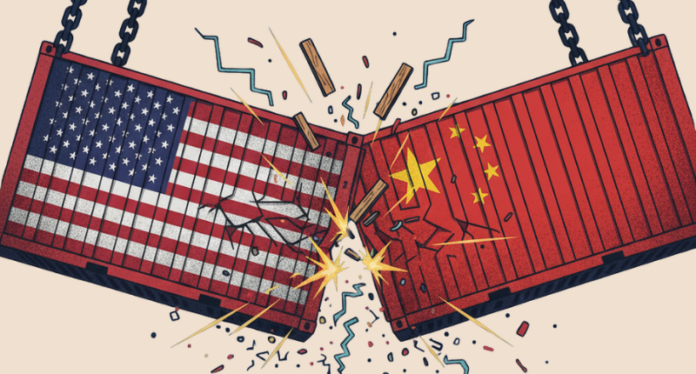WASHINGTON: Finance chiefs gathering in Washington this week were ready to discuss the global economy’s surprising resilience in the face of Donald Trump’s tariff assaults – until the US-China trade war erupted again with the U.S. president threatening 100% duties on Chinese imports and sending markets into a tailspin.
The annual meetings of the International Monetary Fund and World Bank are now certain to be dominated by questions over whether Trump’s vow to retaliate against China’s dramatically expanded export controls on rare earths will plunge the world’s two largest economies back into a full-blown trade war.
A delicate truce crafted by Washington and Beijing over the past five months brought tariffs down from triple-digit levels and prompted upgrades to the IMF’s global growth outlook. Plans for Trump to meet with Chinese President Xi Jinping later this month fueled hopes for a further thaw.
But that optimism was shattered on Friday as Trump threatened to cancel the meeting and impose a “massive increase” in tariffs on Chinese goods, along with other countermeasures.
Souring the mood further was China’s move on Friday to match new U.S. port fees for Chinese-built or owned vessels with its own levies on port calls by ships built or flagged in the U.S. or owned by companies more than 25% owned by U.S.-domiciled investment funds.
The IMF and World Bank meetings will bring more than 10,000 people to Washington, including finance ministers and central bank governors from more than 190 countries.
Martin Muehleisen, a former IMF strategy chief who is now with the Atlantic Council, said Trump’s threats may be posturing for negotiating leverage, but said they will inject volatility into the week’s proceedings.
“Let’s hope that sanity prevails. If Trump goes back to 100% tariffs on Chinese goods, there’s going to be a lot of pain in the markets for him,” Muehleisen said.
Trump’s threat on Friday triggered the biggest U.S. stock sell-off in months at a time when investors and top policymakers were already growing anxious about a frothy stock market fueled by an investment boom in artificial intelligence that some officials fear could hurt future employment.
While China has some leverage over Trump due to its global dominance in rare earths, which are essential for tech manufacturing, Muehleisen said it is not in Beijing’s interest to plunge back into an environment of triple-digit tariffs.
It is unclear whether U.S. Treasury Secretary Scott Bessent, who has led U.S.-China trade talks, would meet with any Chinese officials this week in Washington. A Treasury spokesperson declined to comment on Bessent’s bilateral meetings schedule.
Growth Forecasts Hold Up
Prior to the escalation on Friday’s, IMF Managing Director Kristalina Georgieva had touted the global economy’s ability to withstand multiple shocks, from tariff costs and uncertainty to a slowing U.S. job market, rising debt levels and rapid shifts brought on by AI’s rapid adoption.
In a preview of the IMF’s World Economic Outlook forecasts due on Tuesday, Georgieva said last week that the global GDP growth rate for 2025 would be only slightly less than the 3.3% for 2024. Based on tariff rates that were lower than initially feared – including the U.S.-China duties – the IMF in July raised its 2025 GDP growth forecast by two-tenths of a percentage point to 3.0%.
“What we are seeing is demonstrable resilience in the world,” Georgieva told Reuters in an interview. “But we are also saying it is a time of exceptional uncertainty, and downside risks are still dominating the forecast. So watch it, don’t get too comfortable.”
G7 Focus On Russia
Finance ministers from the Group of Seven industrial democracies are expected to meet on Wednesday to discuss efforts to step up sanctions pressure on Russia that is aimed at ending Moscow’s war against Ukraine.
A British government source said that finance minister Rachel Reeves wanted to ensure joint action with G7 and European Union countries to cut Russia’s energy revenues and access to overseas assets that comply with international law.
Among these options that G7 ministers will discuss is a European Union plan to use Russian frozen sovereign assets to back a loan of 140 billion euros ($162 billion) to Ukraine.
Bessent’s Agenda For Institutions
The U.S. footprint at the meetings will be large, extending from tariff discussions to Bessent’s calls for the IMF and World Bank to pull back from climate and gender issues to focus on their core missions of financial stability and development.
The meetings will be the public debut for Dan Katz, the IMF’s new No. 2 official. Member countries will be watching to see how Katz, a former investment banker who was Bessent’s chief of staff, carries out the U.S. Treasury chief’s agenda, which also calls for stronger IMF criticism of China’s state-led economic policies.
The U.S. Treasury’s market intervention on behalf of Argentina, the IMF’s largest borrower, also will take center stage at the meetings as Argentina’s right-wing libertarian President Javier Milei will join his ally Trump two blocks away at the White House on Tuesday. The move was welcomed by Georgieva to keep Argentina’s market-based reforms on track.
But Muehleisen, the former IMF official, said the Fund risks being pushed by its largest shareholder to enforce Trump’s geopolitical goals – ratcheting up pressure on China and potentially extending more aid to U.S. allies like Argentina without adequate reforms.
“Is it really still a global, multilateral organization, or is it becoming a bit more of an appendage of the U.S. Treasury?” he said. “This will be an interesting debate.”
























